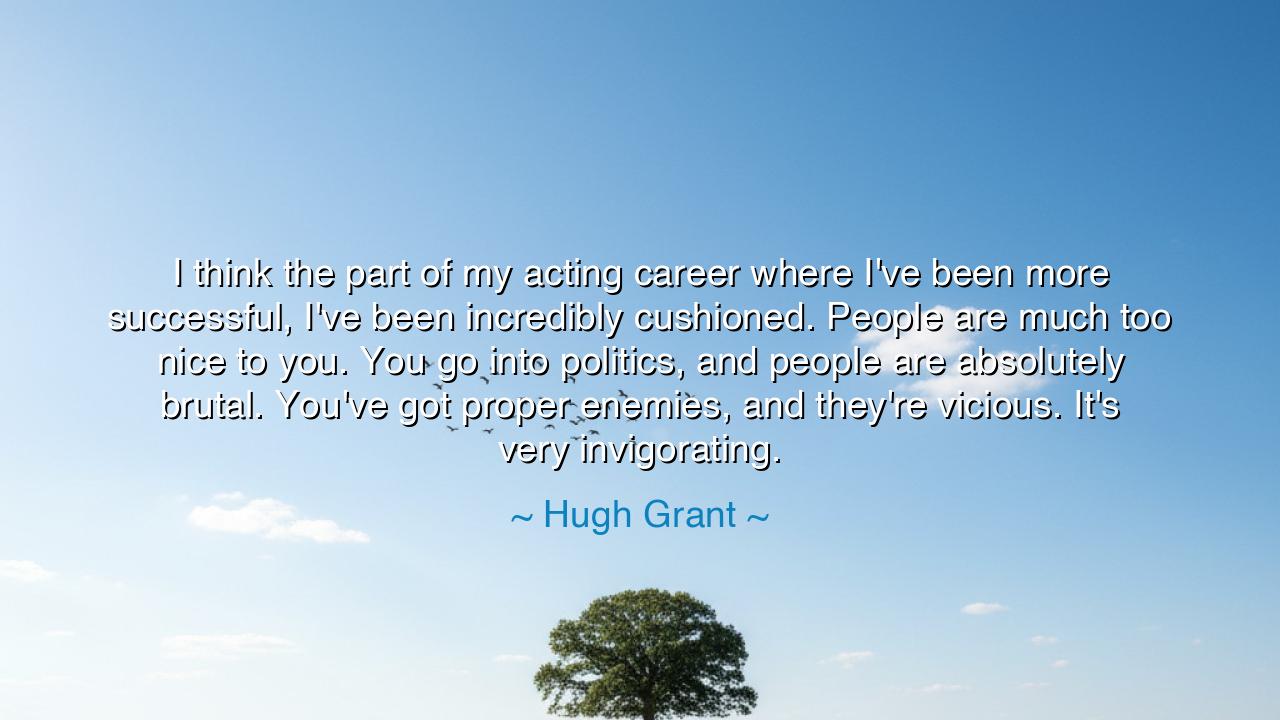
I think the part of my acting career where I've been more
I think the part of my acting career where I've been more successful, I've been incredibly cushioned. People are much too nice to you. You go into politics, and people are absolutely brutal. You've got proper enemies, and they're vicious. It's very invigorating.






When Hugh Grant confessed, “I think the part of my acting career where I’ve been more successful, I’ve been incredibly cushioned. People are much too nice to you. You go into politics, and people are absolutely brutal. You’ve got proper enemies, and they’re vicious. It’s very invigorating,” he unveiled the contrast between two arenas of human endeavor: the stage of acting and the battlefield of politics. In one, the artist is shielded by admiration and praise; in the other, the warrior is battered by hostility, opposition, and ceaseless struggle. Yet within that struggle lies a strange vitality, a fire that sharpens the spirit.
In the world of acting, success often brings comfort. Admirers surround, critics soften, and failure is cushioned by applause. It is a realm where illusion is celebrated, where even flaws can be redeemed by charm. But when one steps into the realm of politics, there is no veil, no script, no stage-light to soften the blows. There are only rivals who strike directly, enemies who plot openly, and challenges that cannot be rewritten. It is brutal, as Grant says—but also real, and therefore, invigorating.
The ancients too knew this distinction. The gladiator, stepping into the arena, faced not the safe illusions of drama, but the edge of steel and the roar of a crowd that demanded blood. And in that harsh truth, many found a vitality unknown to those who lived behind silken curtains. So too does politics demand of its players a readiness to endure, to be scarred, and yet to rise again. It is a place where the soul is tested, and where survival itself becomes a form of triumph.
History offers vivid parallels. Consider Winston Churchill, long scorned and cast aside by his peers. In the safe world of writing and speechmaking he could have lived comfortably, admired from a distance. Yet in the brutal realm of politics he gained “proper enemies,” and through those battles he discovered the very crucible that made him great. His enemies were indeed vicious, yet it was in fighting them that he found his destiny.
Thus, Grant’s words are not merely lament but revelation: comfort weakens, conflict strengthens. The applause of the crowd may warm the heart, but the struggle against vicious enemies tempers the soul like iron in flame. To those who seek a life not of safety but of greatness, remember this truth: it is not in ease that one is most alive, but in the struggle where every blow, every wound, awakens the deepest reservoirs of strength.






THThu Huynh
Hugh Grant's view of politics being brutal but invigorating really makes me think about how politics and fame are treated differently. While fame often shelters you from criticism, politics exposes you to harsh scrutiny. Does this make politics a more authentic environment, or does it just lead to constant negativity? Can we ever move past the ‘brutality’ of politics, or is it built into the system itself?
KLTrieu Khanh Ly
I’m surprised by how Hugh Grant seems to enjoy the brutality of politics, especially considering the toll it can take on people. While it might be invigorating in the short term, I wonder how someone can stay mentally and emotionally healthy in such a high-pressure environment. Is the viciousness of politics something that everyone who enters the field must learn to accept, or are there healthier ways to engage in it without getting consumed by conflict?
KKhoa.98.2009
Grant’s perspective on the rough nature of politics compared to his cushy acting career is an interesting one. Is it a sign of strength that he finds the viciousness of politics invigorating, or is it just part of the overall culture of negativity that often dominates the political sphere? It makes me question whether the combative nature of politics is actually a productive force or whether it simply perpetuates unnecessary division.
QTQuynh Trangg
It’s fascinating that Hugh Grant finds the brutality of politics invigorating. Does this mean he thrives on conflict, or is he just pointing out the intensity of the political world compared to the cushioned environment of acting? I wonder if this type of adversarial nature in politics ultimately leads to better decision-making, or does it just cause more division and gridlock? Can we still have effective leadership without this level of hostility?
ANanhthu nguyen
Grant’s comment about the difference in treatment between acting and politics got me thinking about the way we perceive these two careers. In acting, there's a lot of glamour and adoration, but politics seems to come with constant conflict and criticism. I’m curious: is the ‘brutality’ of politics something that drives real change, or does it just discourage people from engaging? Can a ‘brutal’ system ever truly work for the greater good?